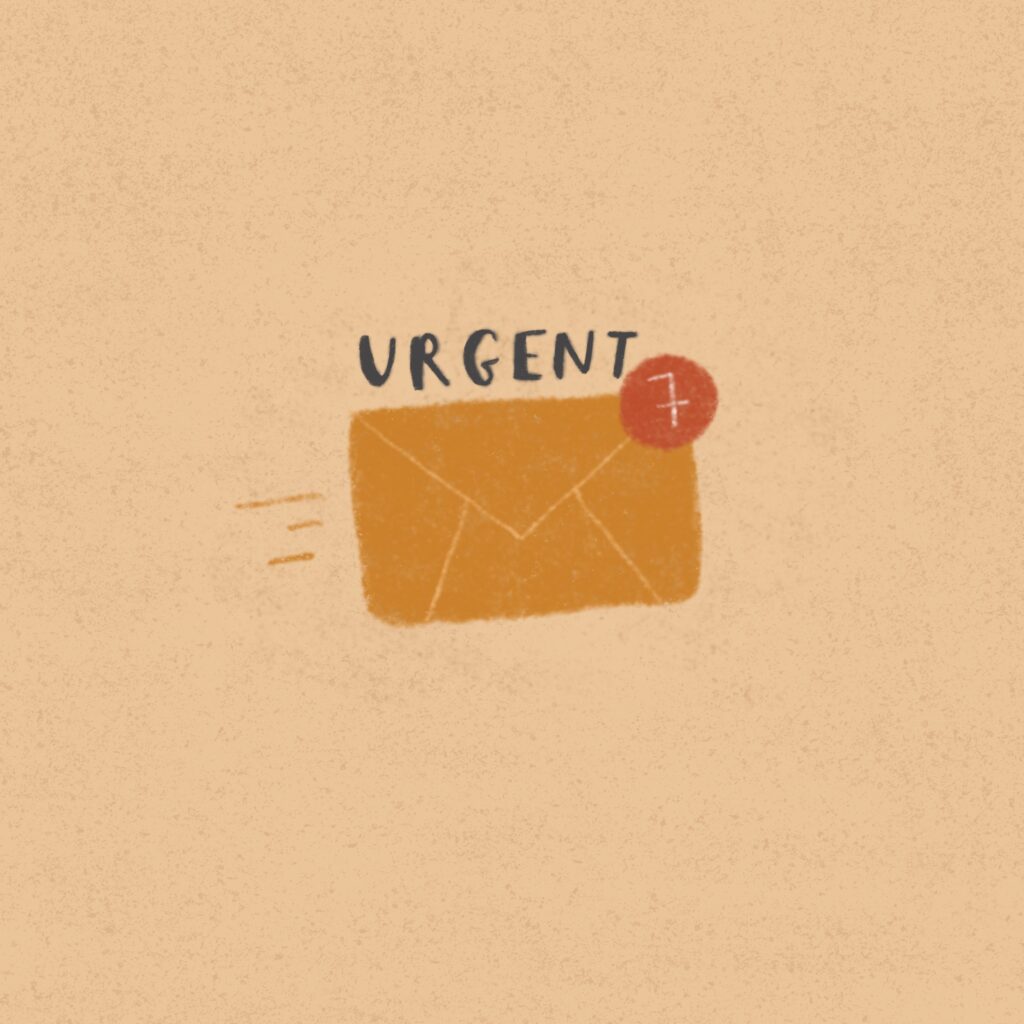In a previous article of mine, I ranted about why today’s society’s obsession with productivity is somewhat dangerous and encouraged myself (and others) to resist the urge to conform to the endless race against ourselves that the infinite logic of productivity socialises us into.
Ever since lockdown – and ever since starting Lazy Women – my interest in this idea further intensified and shifted towards different aspects of the question: why do we crave productivity, and who gets to define what it means? Is it a quality that everyone – men and women – have an equal opportunity to achieve? And finally, why don’t we ever talk about all the work that is done to enable “productive” activities to happen in the first place? These are some of the questions I want to explore in my mini-series of productivity-related articles in the upcoming months, based on personal stories and experiences.
1. I AM WHAT I DO
It is currently 9 pm on a Sunday night and I am replying to my boss on Messenger regarding an ‘urgent’ work-related message. When I started my part-time job as a social media manager for a local politician, the first thing I was told was how flexible this task was going to be and how it all depended on how much I wanted to put into it. ‘Make it your own’, they said. Isn’t this what we all want to hear? I thought it was. First, I put my absolute minimum into it and I did not understand why – after all, it would be so easy to tailor it to my interests. The devils in my brain said “it’s all because you’re too lazy”, or “you don’t care as much about politics as you thought you did”. As this ‘minimalist’ work-attitude doesn’t fit into my narrative of myself, I became more involved. Yet no matter how much I worked, I could never switch off – after all, how can I make something ‘my own’ if I don’t put myself fully into it? And if no one will tell me when that ‘fullness’ is achieved, when will I ever truly stop working?
Don’t get me wrong – I’m not trying to simply complain here, but rather to illustrate the mindset that is familiar to a lot of us, especially now that due to COVID, none of us can work in our ‘traditional’ settings anymore. The COVID crisis though only intensified an already-present tendency within today’s neoliberal market logic: the lack of separation of work and home activities. The public sphere slowly snuck itself into our bedrooms.
Being productive means you are free to do whatever you want, but you still voluntarily choose to spend your time and creative energy on work. The glorification of ‘getting shit done’ (I even made an entire Spotify playlist dedicated to this sentiment), stemming from neoliberal logic, is internalised by society to the point that external coercion is not needed anymore to make people produce. This is what Byung-Chul Han in his book The Burnout Society denotes as ‘psychopolitics’, a new form of invisible power meant to guide our behaviour. New, because it shifts focus from Foucault’s idea of disciplinary power or ‘biopolitics’, in which governments focus on the bodily control of individuals in order to enhance production, to the control over the mind. Invisible, because it is internalised to the point that external enforcement, direct supervision, is not needed. Power, because it profoundly controls and shapes the logic of production.
Han argues that our jobs have become the primary basis of our identities. I am defined by the work I do – it represents my interests and ability to ‘find’ or ‘fulfil’ myself. If you are interested in following the step-by-step process of how I climb the ‘ladder of social mobility’, just check out my daily updated LinkedIn, simple as that. Oh, and please, don’t forget to endorse me on my ‘professional skills’ that you no doubt know so much about even if you’re just a friend. After all, what we do is so connected to who we are.
2. WHY DO I WORK?
A distinctive feature of the realm of psychopolitics is that most of our jobs require at least partial mental effort. Our physical, bodily presence is losing its relevance. COVID might accelerate this transition. Many of us wonder now, how many meetings could have been held via Zoom instead of dragging ourselves across town for it? I find it quite depressing to accept that I live in a system where my full presence is seen as a waste of time, and more importantly, of efficiency. What COVID is perhaps helping us to realise is that the idea of ‘going to work’ is more of a private, psychological need (to leave the house, to feel like you’re doing something) than physical indispensability.
It is exactly because of our internalisation of work-identity, that external force to do our jobs isn’t needed. My identity depends on how well I do my job – hence I am going to do it, for my ‘own sake’. But here comes the twist: according to Han, most of us still do ‘bullshit jobs’ and feel like we are part of a huge production machine where profits are harnessed by corporate agents alien to our day-to-day lives. We burn out because the thing we are asked to put all our creative energy into is not actually important or does not serve a cause larger than profits and production.
Productivity for its own sake can therefore quickly become soul-crushing. Often masked in toxic positivity, corporate mission statements (you can generate your own here, yay!) such as To inspire humanity (JetBlue) and Committed to making a difference (Merck) make us believe that it is within our – bullshit – job that we should find flow, we should find fulfilment. We work so hard that we rarely question why we do it – what it’s all for. We rarely allow ourselves the realisation that our work does not serve a larger goal than the upkeep of a certain brand/agency/non-definable entity. It is in the interest of these firms and companies to mask this from you, from us, as we march together under the unquestioned and worshipped flag of productivity-as-progress.

3. WHY CAN’T I LIVE UP TO MY FREEDOM?
A final consequence of psychopolitics’ power over the mind is that it also transforms the way we perceive leisure. If our minds and creative energies are increasingly required to be put in the service of our professional activity, our ‘free time’ is increasingly confined to a strictly non-productive – and in return, non-creative, non-empowering and non-engaging space. Our only way to ‘switch off’ becomes literally turning our brains off, completely.
Although there is nothing wrong with a ‘wasted’ night watching mindless Youtube (mukbangs or plane crashes, preferably), Tik Tok videos (American teenagers dancing), or reality TV, or scrolling through endless perfectly curated Instagram stories (throw in some occasional activism, girl), we should ask ourselves, why do we need such a drastic distraction from productivity? Once I decide to stop working, I often feel like I’m losing the middle ground. Unable to engage with creative, value-driven yet not strictly revenue-generating tasks, I opt for the easy, unsatisfying, dumbed-down world of ‘pure entertainment’.
In turn, this vicious cycle of the productivity burnout often makes me feel guilty or apologetic about how I actually spend the time I am given to ‘recharge’. Why didn’t I use this time on my ‘personal’ fulfilment, by reading a great book (noted on Goodreads already!), watching a brilliant film (tick, tick, tick), going for a hike (I just love nature), or anything else that I associate a certain value with? The thing is, these activities require mental and physical energy, the ability to compartmentalise, to switch off the cogs of production if you will. Usually, I am way too exhausted by the boundaryless existence of mine in which work is not really work and leisure is not really free time, that non-working becomes this grey in-between where only the strictly un-productive is allowed.
4. THE WAY FORWARD
The glorification of unquestioned and profit-oriented productivity carries the danger of making us unmotivated in the non-work-related sphere of our lives. Paradoxically, mindless distraction – laziness in a negative sense – thrives on this logic; we are all too drained to invest energy in something that does not ‘pay off’ directly, yet we are encouraged to create ‘value’ and ‘meaning’ wherever we go, whatever we do. Laziness becomes the necessary evil in a world that gives so much credit for motivation, ambition and productive creation, especially in jobs that do not yield deeper value than monetary profit.
What’s the way forward then, you might wonder? Boundaries and rituals, it seems. Setting boundaries might initially come across as rude to some (for example when I told my colleague I do not answer work-related messages on Messenger anymore), and even feel artificial; does it really make a difference whether you work only in the living room if you’re home all day anyway? No one knows, but clever people suggest it does. The same goes for rituals. Fortunately, our minds are wired in a way that they are quick to adapt to new circumstances – for a week or two, it might feel strange to roll out of bed before checking social media, then it will feel weird to do it any other way. Just give it a try.
On a final note, having a job is a privilege, being financially independent is a privilege and complaining about it is, too, an immense privilege. I am not advocating for an un-productive society, but for the greater inclusion of who gets a say in what counts as ‘productive’ or ‘lazy’, what creates ‘value’, and which of these get monetised. In my next article, I will discuss how modern, ‘lean in’ feminism has suborned itself to neoliberal logic, and the ways in which this can hinder the emancipation of women and non-binary people.
Until then, here’s to working all day, working all night:
Written by Zsofi Borsi.
Illustrated by Lou Kiss.

